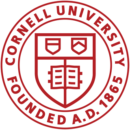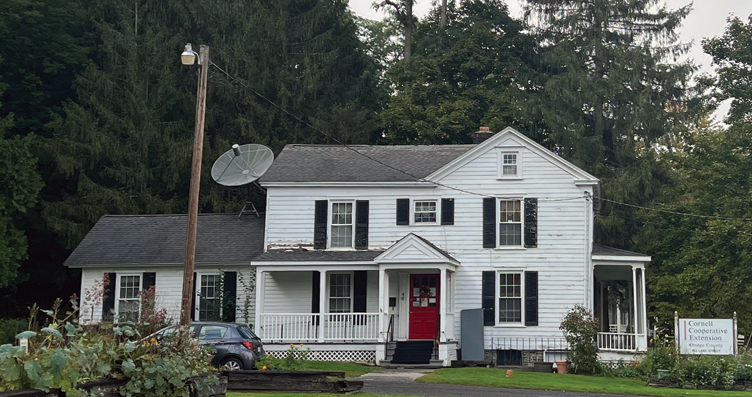Cornell Cooperative Extension
Embarking on Huge Project
By Richard Sternberg

“I am currently raising funds for renovating our offices at 123 Lake Street in Cooperstown,” Liz Callahan, Executive Director of Cornell Cooperative Extension of Schoharie and Otsego Counties (CCE) said. “It’s really involved and we want to do it right.”
CCE will have its interior as well as exterior renovated.
“We want everything to be energy efficient and we need to address the issues that this 100-year-plus building has,” Ms. Callahan said. “We’re looking at plans for energy efficiency, in addition to basic structural and rehabilitation needs throughout the building. Everything from electrical service to plumbing to insulation, but those aren’t the only things that need to be looked at.”
CCE and other parallel organizations related to agriculture have occupied this building since the 1940s.
“The building is deeded to CCE from the Clark family. It must be used with purposes that are aligned with CCE,” she said. “Organizations have floated in and out of the building. It gets a lot of use.”
Which brings us to the renovation project. “The house is a great example of local vernacular architecture. It was a farmhouse. We need something now that accommodates 21st-century programming and office space to match,” she said. “We want more programming spaces for not only CCE programs, but we’d like the community to be able to do programming as well.”
“We need to use our building in a more contemporary fashion,” Ms. Callahan said. “The planning process is just getting started, fundraising is essential now!”

The goal is to have a solid plan by the end of 2023. “Once the plan is complete and fundraising is secure, we imagine this happening over a five-year timeframe,” she added.
CCE was organized on January 5, 1914. Its purpose was to bring scientific principles of agriculture from the universities in New York State, especially from Cornell, to farmers’ attention on how to be more productive and to use best practices.
While that still remains one of its major focuses, CCE has broadened its mission “to put knowledge to work in pursuit of economic viability, ecological sustainability, and social well-being.”
CCE is a nonprofit, unincorporated association, organized under authority of New York State Consolidated Laws, County Law 224(8), as a subordinate government agency and exempt from income tax by Internal Revenue Code 501(C)(3) as an educational organization. On January 1, 2011, CCE of Otsego and Schoharie counties merged.
The Extension System grew out of the Morrill Act of 1862, which allowed for the creation of land-grant colleges in U.S. states using the proceeds from sales of federally owned land, enacted during the American Civil War, and the Morrill Act of 1890 (the Agricultural College Act of 1890) expanded this model.
The purpose of land-grant colleges was “without excluding other scientific and classical studies and including military tactic, to teach such branches of learning as are related to agriculture and the mechanic arts, in such manner as the legislatures of the States may respectively prescribe, in order to promote the liberal and practical education of the industrial classes in the several pursuits and professions in life.” (United States Code, Section 307).
Cornell University, New York’s land-grant institution has provided quality, research-based programs and resources to all New Yorkers through the Cornell Cooperative Extension educational system since 1914.
Today, CCE serves New Yorker’s needs through five broad areas: 4-H Youth Development, Agriculture and Food Systems, Community and Economic Vitality, Environment and Natural Resources, and Nutrition and Healthy Families with research-based programs or “transitional research” from Cornell’s colleges of Agriculture and Life Sciences, Human Ecology, and Veterinary Medicine. These colleges develop programs and partner with other colleges at Cornell, the State University of New York schools, and other institutions.
CCE’s 4-H Youth Development programs teach knowledge and life skills to create opportunities for positive youth development through classroom, after school, community clubs, and camp settings. Nearly 500,000 youth from all communities across the state, rural, urban, and suburban, participate annually.
Major 4-H programs provide opportunities in science and technology, community action and healthy living. This weekend, CCE in Cooperstown is hosting a 4-H course for youth to learn dog handling skills. It is limited to youth 8 years and older with dogs 3 months old and greater. It is scheduled for Sunday, October 2, from 2:00 p.m. to 3:30 p.m. Call 607-547-2536 ext. 225 or email Teresa Adell at tla47@cornell.edu for more information.
Agriculture and Food Systems programs comprise what are generally thought of as the original mission of the extension service. These programs bring knowledge and information from the university and other academic institutions to the agricultural community to teach best practices to promote profitability, sustainability, environmental stewardship, safe, reliable healthy food supply, renewable energy, and recreational and agricultural tourism.
Community and Economic Vitality programs help New Yorkers negotiate changes in economic structures, transportation and residential patterns, demographics and communication technologies, in order to respond to opportunities. CCE partners with academic organizations, local officials, not-for-profit organizations, planners, policy makers, and community leaders to carry this out.
Environment and Natural Resources programs educate about: water resources; agricultural and environmental management; forestry; wildlife habitat and human interactions; fisheries; lawn and turf; invasive species; energy conservation and renewable sources, and climate change. These programs serve resource managers including farmers, the general public and policymakers.
Nutrition and Healthy Families programs help reduce the prevalence of childhood obesity and chronic disease, improve nutrition and health practices, as well as through affecting changes in the community to promote health. These programs support education in financial literacy, healthcare, groceries, and energy costs and conservation, benefiting individuals, caregivers professionals, community leaders, and policymakers.
CCE has a mission and resources much broader than the average person is aware of. Feel free to contact them with any questions. You can also find out much about the organization, their available resources, and scheduled programs and meetings at cceschoharie-otsego.org

